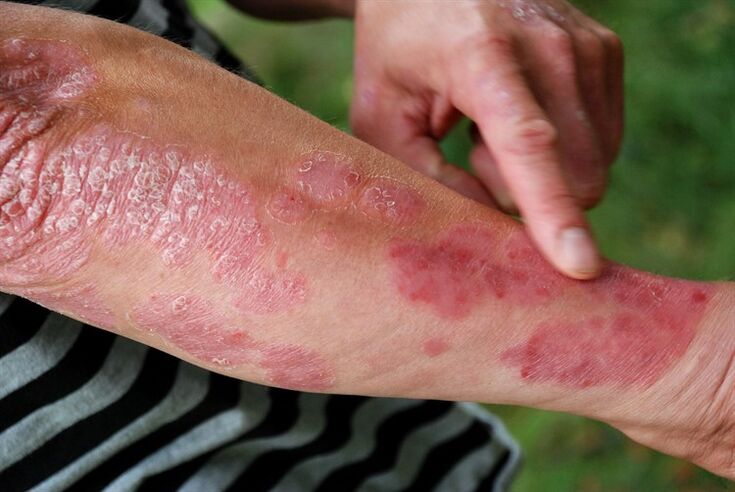Psoriasis is a common skin disease. Its name is derived from the Greek word "psora" (translated as "itch"). Today, about 5% of the world's inhabitants have this disease.
Psoriasis can occur at any age, from infants to the elderly. In fact, the majority of patients are young people. They go to the doctor with suspicion of psoriasis.
Before you go to the clinic, you need to know which specialist to contact when you have such complaints.
Which doctor should I contact if I suspect psoriasis?

In the case of the first signs of psoriasis, it is necessary to consult a dermatologist. After all, the symptoms of this disease first appear on the skin.
A qualified specialist in the treatment of skin diseases will make an accurate diagnosis and take all necessary treatment measures.
If the patient has a complex type of psoriasis (psoriatic arthritis), treatment should be carried out by a rheumatologist.
Regardless of which specialist the patient turns to, the doctor can easily confirm or, conversely, refute the presence of this disease.
Treating any form of psoriasis is a laborious process. By the way, a complete cure does not happen in principle. Even when the symptoms disappear, the disease is still in a regressive stage. In this case, the symptoms may disappear completely.
Which doctor treats psoriasis?
Psoriasis is a systemic disease, its symptoms are not limited to itchy rashes on the skin. Often, its course is accompanied by changes in metabolism, immune disorders, as well as malfunctions in the endocrine system.

Violations quite often affect the work of internal organs. Therefore, consulting a dermatologist in this case is not enough.
Psoriasis patches in many patients form on the scalp. In this case, it is also necessary to consult a suitable specialist.
Dermatologist
It is very important that a patient with psoriasis be monitored regularly by an experienced dermatologist. This is very important, as this disease can get worse even years after going into remission.
In addition, the specialist conducts the necessary studies to identify the underlying disease, which may have caused the development of the skin disease.
In this case, it is necessary to carry out its effective treatment.
All treatment measures, no matter how severe, must be approved by a dermatologist. Sometimes psoriasis provokes the development of a pathology that affects the joints - psoriatic arthritis. In case of any complications, the specialist will refer the patient to a rheumatologist.
Specialist doctor
When answering the question of which specialist treats psoriasis, many people forget that it is important not only to eliminate the external manifestations of the disease, but also the causes of poor health. Accordingly, to effectively treat the disease, it is indispensable with the help of highly qualified specialists.

The following are doctors who treat psoriasis and its common complications:
- gastroenterologist: this doctor's help is required in cases of severe organ damage. In this case, it is often necessary to take strong drugs. Despite the fact that they negatively affect the condition and work of the stomach, liver, the course of treatment with the use of these drugs gives a good effect;
- Cardiologist: pathology that can be accompanied by significant disturbances in the work of the heart (pericarditis, myocarditis). In such cases, the patient only needs the professional help of a cardiologist;
- nephrologist:some forms of the disease are accompanied by major failures, partial dysfunction of the bladder, kidneys. Treatment of such pathologies should be carried out by a qualified physician;
- neuroscientist:Neuropathy often causes recurrence of skin disease. Accordingly, patients who are prone to developing prostatitis (or when it recurs) should have a prophylactic examination every 3-6 months;
- rheumatologist: in case of joint disease, consultation with a rheumatologist is required. It is impossible to cure the disease without choosing the right treatment principles.
Pathological treatment is effective only with timely action. Compliance with the doctor's recommendations will allow you to cope with mental discomfort, as well as exclude the development of complications in the future.
It is recommended that all patients with psoriasis be observed by a psychologist. More than 78% of the exacerbations of the disease are caused by nervous tension, severe stress.
An experienced psychologist will help each patient deal with emotional stress. Thanks to that, it will be able to adapt much better in society.
Clarifying the diagnosis: what medical examinations do you need to undergo?

During the initial diagnostic examination, if psoriasis is suspected, the patient must undergo the following mandatory tests after the initial examination:
- Urinalysis: needed to determine the water-salt balance;
- stool analysis:necessary to detect the possible presence of helminths in the body;
- blood tests: general, as well as biochemistry. Many patients mistakenly believe that blood helps to refute or confirm the diagnosis. However, this is not entirely true. Such a study is done to determine possible complications due to this disease. Blood also allows you to determine the presence of allergic reactions in the body.
Additional studies include:
- Bacterial culture: to be performed if a rash appears on the mucous membranes. This is necessary to exclude pharyngitis (acute);
- X-ray: if the patient has pain in the joints and the doctor suspects the presence of psoriatic arthritis, an ancillary study of the bone structure is performed;
- skin biopsy: to clarify the diagnosis, a cytological examination of the epidermis is performed, which has been removed from the affected skin. Samples are taken from one or more areas of the body.
What does the patient's full medical support include?
The ultimate aim of a doctor's work is to preserve a person's ability to work, as well as prevent the disability of patients with psoriasis.
If the patient who has requested qualified help is in a serious condition, inpatient treatment is required. Under satisfactory conditions, experts recommend observing the distribution.
In this case, you need to see your doctor regularly. As a result, the progression of the disease can be better controlled.
Adequate medical support for a patient with psoriasis includes treatment in a nursing home or special clinic. It is not uncommon for patients to have to go to a specialized hospital for two weeks.
In such medical facilities, patients are under the constant supervision of experienced specialists. At the same time, not only can the treatment effect be controlled. The nursing home also devised the most suitable menu for guests with psoriasis.
Many would agree that psoriasis is an unpleasant disease for the patient (from a physical and ethical point of view). Fortunately, today's medicine knows many ways to effectively treat psoriasis.
Patients should know that today there are many specialists available to assist them. Regardless of the extent of the disease, this disease must be handled competently. Only in the case of the correct application of the method can a positive result and sustainable remission of the disease be achieved.

























